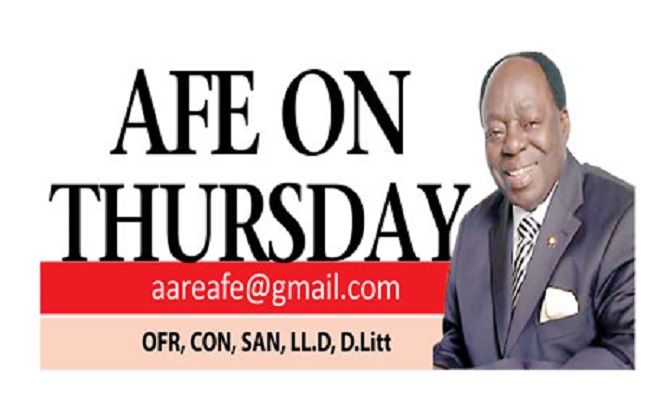I remember very vividly the “Old Primary School Right of Passage”. For a child to be admitted into primary school when I was young, such a child must pass the hand over the head to ear rule. The child must be able to touch the tip of the opposite ear with either raised hand passing over his or her head. If a child was not able to achieve this, such a child was deemed too young to start primary education. This was a heart breaker for many children at the time. There is another heart breaker now. In April 22nd 2024, it went viral that the Federal Government has pegged the minimum age of entry into the university at 18 years. By this directive, a child is expected to commence primary school at age 6, enter into secondary school at age 12 and enter into the university at age 18 years. This rule allows for no exception. This was the directive of the Joint Admission and Matriculation Board (JAMB) which is the agency that qualifies eligible students for admission into tertiary institutions in Nigeria through its yearly Unified Tertiary Matriculation Examinations (UTME). This directive has met with a lot of criticisms from parents and tertiary institutional heads.
Following the overwhelming criticisms, the Education Minister, Professor Tahir Mamman announced the minimum tertiary institution admission age has been reduced to 16 years. This was on the basis that it was “illogical for a 16-year-old student to pass WAEC, JAMB and be denied admission. I strongly believe that this concession is still not good enough. Should the education of a child who had passed all prequalification requirements for admission into tertiary institutions be truncated merely because of his or her age?
Age is not maturity
Professor Tahir Mamman said “…the candidates are too young to understand what university education is about… if they are too young, they won’t be able to manage things properly…” Elaine Aaron, the American Psychologist and the author of the international best-seller – ‘Highly Sensitive Person’, said: “what could we need more right now than people who think carefully, feel deeply, notice the subtle details, and end up having the big picture?”
These four qualities are essential to nation building. Age is not one of them, neither is it a requirement to obtaining any of them. Maturity is not a function of age. Rather, it is a function of the mindset, emotional intelligence and the ability to understand oneself and the world. Maturity is earned from training the mind, not from aging. Consequently, we have many adults who are all but mature in the way they think, act, or relate with others and the world they live in. Conversely, we have children who have defied all odds and achieved even the seemingly impossible. I have compiled a short list of people I consider to be Young Achievers hereunder. This is because they knew the value of mind enrichment at a very young age and pursued it.
- Soborno Isaac Bari: This is an 11-year-old genius who was the 2020 child prodigy nominee and also christened the Einstein of our time. At the age of six, Soborno was recognised as a scientist by Harvard University (one of the best universities in the world). He also won the Child prodigy award as a scientist. These achievements of his compelled the Ruia College of Mumbai University to appoint him as a scientist and visiting professor of physics at the age of 11. Soborno has authored two books and given lectures in several Indian Universities. He has also been offered admission into the New York University this summer.
- Yasha Asley: This is another brilliant child genius who was dubbed the human calculator. He is 14 years old and is currently teaching at the University of Leicester, England, while pursuing his own degree in the same university. Since realising his potential in mathematics, his father drops him at the university daily for him to sharpen his knowledge. When he was 13 years old, he was contacted by the university of Leicester. The panel that reviewed him was shocked at the extent of his knowledge. Hence his appointment to teach in the university. This was because they realised that he was an asset to the university. He was appointed a professor at the university at the age of 14 years.
- Alia Sabur: Alia gained admission to the Stony Brook University at the age of 10 years. She graduated at the age of 14 years (one of the youngest university graduates of all times), finished her masters at age 17 years and became a visiting professor at the Department of Advanced Technology Fusion at Konkuk University in Seoul, South Korea at age 18 years (three days to her 19th birthday).She has been acclaimed by GuinnessWorld Record as the youngest professor in the world.
- Colin Maclaurin: He held the position of the world’s youngest professor before Alia Sabur for 291 years.He gained admission into the University of Glasgow at the age of 11years and became a full professor at19 years.
- Erik Demaine: Erik became a professor of mathematics at the age of 20 years. He started his university education at the age of 12 years when his mates in Nigeria will just start JSS 1. He completed his PhD at the University of Waterloo at the age of 20 years. In 2001 he became an assistant professor at MIT, the youngest in its history.
These are not all. Charles Homer Haskins finished his Ph.D. at Johns Hopkins University at the age of 19. He became a full professor at the age of 22 years. Terence Tao began taking university level maths course when he was nine years. He graduated from Flinders University at 16 years. He earned his PhD at the age of 21 years from Princeton University in the United States. Tao was employed to teach at the University of California and was promoted to full professor just three years later.
Stephen Wolfram had authored three books on particle physics at 14 years. And published his first scientific paper on quantum field theory at 15 years. He earned his Ph.D. in particle physics at the age of 21 years and was offered teaching appointment at the California Institute of Technology(his alma mata) the same year.
Charles Fefferman was offered full professorship from the moment he bagged his PhD at age 22. Murray Gell-Mann bagged his Ph.D. at age 22 years and became a visiting professor at 23 years. He also won a NobelLaurette in 1969 for his work on the theory of elementary particles. Karl Witte bagged Ph.D. at 13 years. Kim Ung-Yongbagged her Ph.D. at 15 years;and the list goes on and on.
Nigeria’s minimum age for admission policy
I am not shocked that no Nigerian was named among the young achievers identified above.
This is because there are strategic policies that suspends the laudable achievements ofbrilliant young minds till later ages. The proof of this assertion is all around us.
- Ekele Franklin:While his mates in the West and Middle-East were already pursuing either their maters or doctoral degrees, Ekele Franklin, the overall best candidate in the 2020 UTME with a score of 347 was denied admission into tertiary institutions because he was 15 years old!
- David Okorogheye who had 332 in the UTME in 2021 was denied admission because he was not yet 16!
- Tochukwu Nwafor who completed his secondary education at 14 years was also precluded from going into the university because of his age!
- Oyende Faith: Faith is the best graduating student in the department of Bio-Chemistry of the Lagos State University in 2021. She told the press that she wanted to become a medical doctor but was denied admission twice on the basis of her age!
- Orisheneye Okorogheye had A1 in all his subjects in his WAEC andhas the dream to become a neurosurgeon. He was however denied admission into tertiary institution in Nigeria because he was 15 years old!
In my candid opinion, the only factor that separates the young achievers earlier mentioned and these brilliant Nigerian teenagers is that the young achievers were birthed into societies who understood, appreciated and are willing to nurture their gifts. Their societies were willing to make exceptions to accommodate their giftings. That is where Nigeria falters as a nation.
Having a minimum age of admission into the tertiary institution rule that allows for no exception is a problematic position that will in the long run affect the dreams of the younger generations.
In several developed nations of the world, there is a minimum age qualification requirement. In the United Kingdom (UK) it is 18 years. In Australia it is 17 years.
However, this rule is not strict. In the UK for example, the University reserves the right to waive the minimum admission age requirement on an individual basis upon the fulfilment of certain conditions.
In Australia, the Academic Board of the school may grant a candidate who is not 17 years an exemption depending on his or her performance in the qualifying examinations.
In some other countries like Norway, there is no specific age limit for admission into tertiary institutions once the candidate meets the academic entry requirements.
Also in South Korea, there is no age requirement in the admission criteria into tertiary institutions. All the candidate needs is to meet all academic entry requirements.
Conclusion
Age is not maturity.Children are now demonstrating exceptional academic intelligence which is not common in their ages. I strongly believe that no child deserves to have his or her dreams impugned upon by reason of age alone.
University autonomy includes among other things the discretion to waive the minimum age requirements for students who pass the minimum admission requirements and possess exceptional academic potentials. This is as obtainable in the UK, Australia, Norway and South Korea.It should not be within the competence of the Federal Government to direct that students of certain ages are disqualified from entering into tertiary institutions after they had met all other admission requirements.
Victor Omololu Sowemimo Olunloyo took his Higher Secondary Examination (HSE) at the age of 13 years. Firstly, he registered for the examination at an age way younger than his peers. Secondly, he took the exams only after three months of registering, what ought to have taken him 2 years. He cleared all his paper in one sitting. He thereafter took his advanced GCE and cleared it also in a sitting. By implication, he was qualified to enter into the University at a tender age of 13 years. Sadly, there was no university in Nigeria at the time. He had to travel abroad for his BSC, Masters and Ph.D. He became the Commissioner for Economic Development for the Western Region in 1962 at age 27 and became the Governor of Oyo state in 1983.
Imagine if there had been a rule that delayed his progress at that time, I doubt he would have achieved all that he achieved. It is this limitation that we are now imposing on the younger generations.
I suggest that we do not forge with our own hands the chain that will hamper the development of our gifted children. The minimum age requirement should also give universities the discretion to admit children below the age of sixteen (16) who are endowed with exceptional ability.
Read Also: NELFUND, Kebbi govt partner to expand student loan access
WATCH TOP VIDEOS FROM NIGERIAN TRIBUNE TV
- Let’s Talk About SELF-AWARENESS
- Is Your Confidence Mistaken for Pride? Let’s talk about it
- Is Etiquette About Perfection…Or Just Not Being Rude?
- Top Psychologist Reveal 3 Signs You’re Struggling With Imposter Syndrome
- Do You Pick Up Work-Related Calls at Midnight or Never? Let’s Talk About Boundaries







